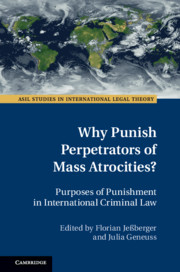Book contents
- Why Punish Perpetrators of Mass Atrocities?
- ASIL Studies in International Legal Theory
- Why Punish Perpetrators of Mass Atrocities?
- Copyright page
- Contents
- Contributors
- Preface
- Abbreviations
- 1 Introduction: The Need for a Robust and Consistent Theory of International Punishment
- 2 The Practical Importance of Theories of Punishment in International Criminal Law
- Part I Setting the Framework: Criminological, Historical and Domestic Perspectives
- Part II Rationales for Punishment in International Criminal Law: Theoretical Perspectives
- 9 ‘Can I Be Brought before the ICC?’
- 10 An Argument for Retributivism in International Criminal Law
- 11 An Expressive Theory of International Punishment for International Crimes
- 12 We’re Exhausting Ourselves, Let’s Get Busy Instead
- 13 Positive General Prevention and the Idea of Civic Courage in International Criminal Law
- 14 The Individual and the International Community
- 15 The Right to Punishment for International Crimes
- Part III Consequences for the Practice of the International Criminal Court
- Select Bibliography
- Index
15 - The Right to Punishment for International Crimes
from Part II - Rationales for Punishment in International Criminal Law: Theoretical Perspectives
Published online by Cambridge University Press: 07 February 2020
- Why Punish Perpetrators of Mass Atrocities?
- ASIL Studies in International Legal Theory
- Why Punish Perpetrators of Mass Atrocities?
- Copyright page
- Contents
- Contributors
- Preface
- Abbreviations
- 1 Introduction: The Need for a Robust and Consistent Theory of International Punishment
- 2 The Practical Importance of Theories of Punishment in International Criminal Law
- Part I Setting the Framework: Criminological, Historical and Domestic Perspectives
- Part II Rationales for Punishment in International Criminal Law: Theoretical Perspectives
- 9 ‘Can I Be Brought before the ICC?’
- 10 An Argument for Retributivism in International Criminal Law
- 11 An Expressive Theory of International Punishment for International Crimes
- 12 We’re Exhausting Ourselves, Let’s Get Busy Instead
- 13 Positive General Prevention and the Idea of Civic Courage in International Criminal Law
- 14 The Individual and the International Community
- 15 The Right to Punishment for International Crimes
- Part III Consequences for the Practice of the International Criminal Court
- Select Bibliography
- Index
Summary
Jens David Ohlin develops from human rights what he calls a theory of ‘expressive retributivism’ for international crimes (and other severe human rights violations). Relying on the jurisprudence of the European Court of Human Rights he argues for a state’s duty to punish international crimes, a duty that is owed to the victims and based on human rights. He states that in the context of international criminal law, even mercy is a human rights violation. Ohlin connects his theory of ‘expressive retributivism’ to the anti-impunity discourse in international criminal law, and argues that, if states do not comply with their duty to punish international crimes, the ICC can step in. The victims’ human right to see their perpetrators punished also explains their role and significance in international criminal procedure.
Keywords
- Type
- Chapter
- Information
- Why Punish Perpetrators of Mass Atrocities?Purposes of Punishment in International Criminal Law, pp. 257 - 282Publisher: Cambridge University PressPrint publication year: 2020



